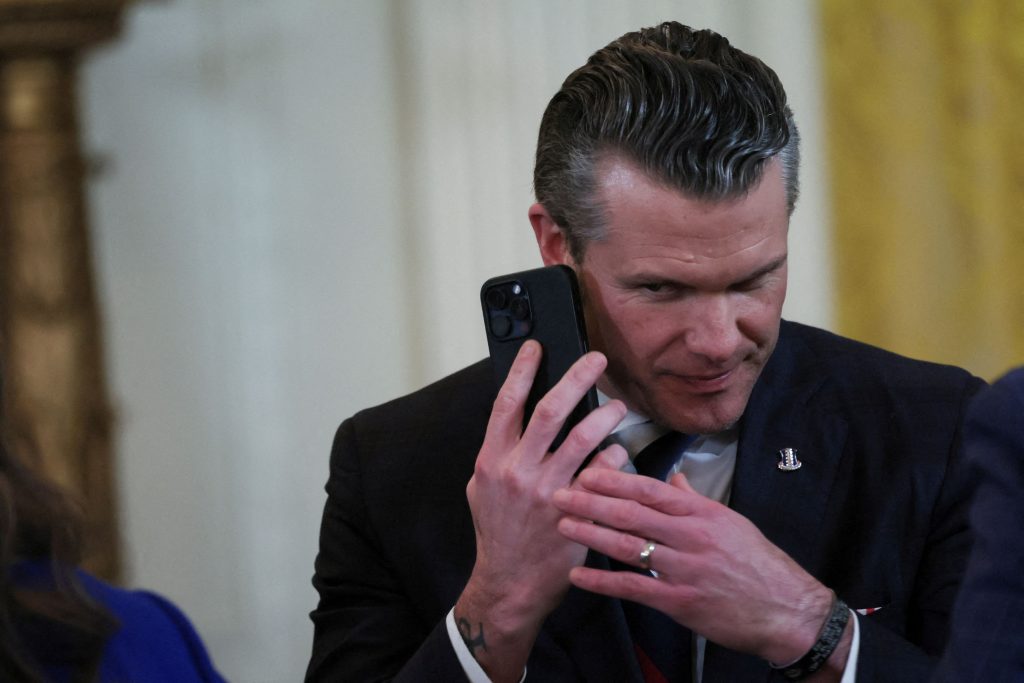WASHINGTON—Israel provided sensitive intelligence from a human source in Yemen on a key Houthi military operative targeted in an attack described by national security adviser Mike Waltz in an unclassified Signal chat with senior Trump administration officials, two U.S. officials said.
Shortly after the U.S. strikes began, Waltz texted that a key target of the attacks, a Houthi missile expert, had been seen entering his girlfriend’s building, which he said had been destroyed.
Israeli officials have complained privately to U.S. officials that Waltz’s text has become public, one U.S. official said.
Israel’s role in supplying information that helped track the militant highlights the sensitivity of some disclosures in the texts and raises questions about the Trump administration’s contention that no classified information was shared on the Signal chat, a publicly available nongovernmental app.
“The first target—their top missile guy—we had positive ID of him walking into his girlfriend’s building and it is now collapsed,” Waltz wrote.
Waltz didn’t describe the sources of the intelligence but said in another text that the U.S. has “multiple positive ID.” The U.S. also received intelligence about the targets struck in the attack from surveillance drones flying over Yemen, defense officials said.
Waltz’s post came in response to a question from Vice President JD Vance about the results of the strike that the national security adviser had initially reported in the chat.
The messages shared by Waltz and other senior Trump officials were disclosed this week by the Atlantic magazine, whose editor in chief Jeffrey Goldberg was included in the Signal chat group, apparently by mistake.
In a Pentagon briefing two days after the March 15 strikes, Air Force Lt. Gen. Alexus Grynkewich, director of operations for the Joint Staff, told reporters that the U.S. had struck over 30 targets, including Houthi command and control centers and a compound where “several senior Houthi unmanned aerial vehicle experts” had been located. While he said there had been dozens of military casualties, he did not mention the missile expert.
The identity of a person in Yemen who was supplying information in real-time about the strikes would likely be carefully protected.
Asked whether Israel had provided intelligence for the strike described by Waltz, National Security Council spokesman Brian Hughes said, “No classified information was included in the thread.”
Echoing comments made by Waltz, Defense Secretary Pete Hegseth, and other senior officials about the Signal chat, he added, “the messages have no locations, no sources and methods, and no war plans. Foreign partners had already been notified strikes were imminent.”
The Israeli prime minister’s office and Embassy in Washington declined to comment. Media representatives for the Israel Defense Forces, Defense Department, Central Intelligence Agency, and office of Director of National Intelligence didn’t immediately respond to requests for comment.
After an initial wave of attacks, Waltz posted real-time information into the Signal chat. “VP. Building collapsed. Had multiple positive ID. Pete, Kurilla, the IC, amazing job,” he wrote at 1:48 p.m., naming the defense chief, the head of U.S. Central Command, Army Gen. Michael Erik Kurilla, and the intelligence community.
The text confused Vance: “What?” he replied six minutes later, perhaps because of the reference to “VP” at the start of the message. Waltz clarified at 2 p.m., saying he had typed too fast. He repeated that the Houthi missile expert was seen going into his girlfriend’s home and that the building was destroyed.
“Excellent,” Vance quickly responded.
The Biden administration sought last year to develop options to strike senior Houthi military and political leaders and approached the Israelis and Saudis for help, according to people familiar with the classified planning. It didn’t decide to carry out those strikes, but the work on those options appear to have given the Trump administration a start in developing targets for their March 15 strike on Houthis militants in Yemen.
Waltz has taken responsibility for initiating the Signal chat and inadvertently adding Goldberg to it. President Trump has defended him, calling him a “good man” who made a mistake. Hegseth also shared sensitive information in the chat, including when jet fighters took off and the approximate times of attack.
Current and former officials say intelligence leaks could compromise foreign intelligence sources and make other nations reluctant to share such sensitive information. Trump officials have said in recent weeks that they have redoubled their efforts to prevent leaks of classified information.
The administration launched the strikes to stop the Houthis from attacking commercial and military ships transiting the Red Sea, once one of the busiest commercial waterways, and to deter them from continuing missile strikes aimed at Israel. The U.S. has conducted attacks in Yemen every day since the initial March 15 strikes discussed in the Signal chat. On Thursday, the Houthis fired at least two missiles toward Jerusalem, which Israel intercepted.
Write to Nancy A. Youssef at nancy.youssef@wsj.com , Alexander Ward at alex.ward@wsj.com and Michael R. Gordon at michael.gordon@wsj.com








